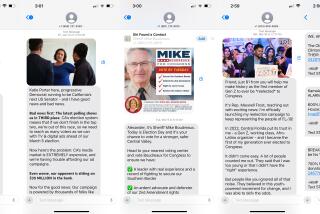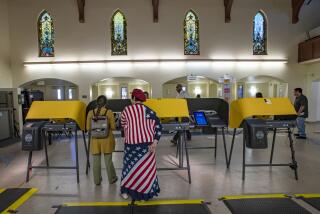Candidate Polling
- Share via
Special-interest groups have a long history of stifling public debate and dragging down public servants, but in this election year they have stooped to a new low.
Candidates for public office are now bombarded by questionnaires and stern evening phone calls from groups that are busy cataloguing us according to mind-set.
The questionnaires only provide the opportunity for yes or no answers on extremely complex issues, and, most often, the issues don’t relate to the office that is being sought by the candidate.
All of the questionnaires are mailed with a cover letter or preface that declares that an educated electorate can be a powerful ally and that a well-informed citizen is more likely to vote. Each group thanked me in advance for taking a couple of minutes to answer a few questions. Friendly enough? Not quite.
The cover letters contain a lot of unfriendly language, written in bold print and underlined. They warn us of absolute last dates for response, and we are reminded that they reserve the right to list us in paid media ads as non-respondents if we don’t comply. Who died and left these folks in charge?
I’ve spoken with other candidates whose first thoughts were the same as mine. Throw the questionnaires in the trash and forget them, encourage public debate and diversity of opinion, participate in forums and town hall meetings, and, above all, gain the best possible understanding of what the community expects of us when we are chosen to represent it.
Good thought, but as the deadlines passed, the evening phone calls began. The callers have a certain “collection agency” style. During a couple of those calls, I attempted to offer my rationale for not responding, but that fell on deaf ears. Most waited patiently until I finished, and simply repeated that I had missed the deadline and gave me another absolute final deadline.
MARTIN DAVIS
Escondido
(The writer is a candidate for the Palomar Pomerado Health System board of directors.)
More to Read
Get the L.A. Times Politics newsletter
Deeply reported insights into legislation, politics and policy from Sacramento, Washington and beyond. In your inbox twice per week.
You may occasionally receive promotional content from the Los Angeles Times.










